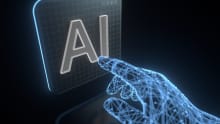Cognitive tech - the new "SMART"

Every few months, I have the amazing opportunity to meet people who significantly impact what I know and believe. I walk up on stage in front of the huge batch of campus hires at our Global Education Center in Mysore, and welcome them to the company that will soon be their second home. It is a great experience to meet the young minds, who are the future of the industry; and what they teach me is equal to or more than what we impart through our rigorous training in base and new technology.
It is this focus on technology, in all forms, that is the core of what we do here at Infosys. We embrace technology in many ways, and leverage it to ensure a seamless experience for our employees, from campus hires to the long-tenured, while at the same time, navigate this change in scale without losing the human core. Our teams use technology to build apps, automate processes, and create systems that manage scale, but we rely equally on the interactions that these future employees have with leaders and HR teams to make the first day of their careers unforgettable.
Just like any other business unit, HR isn’t immune to the advances in tech, and with the onset of cognitive technology, the future of HR is a truly exciting one. AI, IoT, VR, etc. are making waves in all fields of science and business, and are slowly seeping into HR too.
On the other side of the coin, the future of HR is challenging because employees perceive any form of cognitive tech as a threat to their job security. The role of HR would be more important now, to assure people of their skills and the need to exercise the same, while automating the redundant parts of their jobs. It’s a fine line that we need to tread without ever losing the human touch. But data cannot be denied: According to a report by Narrative Science, based on a survey of 235 business executives conducted by the National Business Research Institute (NBRI), 38 percent of enterprises are already using AI in their workplace and by 2018, this percentage is estimated to go up to 62 percent. Bersin by Deloitte reveals that 33 percent of employees expect their jobs will become augmented by AI in the near future, while a survey of HR executives by IBM found that 46 percent believe AI will transform their talent acquisition capability, and 49 percent believe it will transform their payroll and benefits administration. McKinsey Global Institute predicts that 51 percent of all jobs could be automated in the next 20 years! And this isn’t limited to the IT industry. Professions like medicine, law and banking, which are usually heavily people-dependent, are embracing AI. Even in sports like sailing, rowing and fencing, there has been a massive introduction of tech for more accuracy in recordings and motion sensors.
The change from atoms to bits is irrevocable and unstoppable. Why now? Because the change is also exponential — small differences of yesterday can have suddenly shocking consequences tomorrow.” – Nicholas Negroponte
Of course, there is so much to be gained by embracing cognitive tech. It is the new “smart”, and while some tech has already started making an impact on HR, others are slowly making inroads. AI and the application of complex algorithms can gauge the pulse of employees by analyzing data from internal social networks, surveys, etc. AI could also help HR tackle attrition by predicting it. Virtual Reality has many exciting possibilities, like making the onboarding experience that much more real with VR walkthroughs and games, amp up the possibilities with simulators for learning and let employees interact with clients from wherever they are!
By coupling IoT with items like personal fitness bands, we can encourage fitness and health among employees. It can also help us ensure safer workplaces, by making ID cards smart with location trackers. Finally, we have core tech that work on large volumes of data, i.e. Blockchain and Cloud Infrastructure. Since Blockchain can be used to store data and make value chains shorter and safer, it can be used to run background checks of thousands of employees with lesser manual effort. Data storage in the Cloud can also help HR store swipe records, benefits, etc. in a more efficient way. All of these possibilities help reduce the redundant work that HR teams often face. The introduction of cognitive tech could redesign the entire employee experience, improving the value of HR too.
At Infosys, our organizational strategy of renewing core businesses and innovating into new areas of business is supplemented by a strong foundation in the importance of automation, innovation and a culture of learning. Our teams find ways to introduce automation into their work, to free up time for innovation. Our NIA platform is a step forward in this journey. In HR, we have introduced an integrated helpdesk that makes query resolution (previously a pain point) more effective and easy. Bots are currently very “on trend” given their ease of use and easy applicability for collaboration.
We also leverage new technology to identify networks of influence within the company, using internal tools, surveys and more. We’re exploring wearable tech to ensure the safety of employees through easy location monitoring. As HR, we collaborate with the business teams to see how we can leverage their extensive tech knowledge to better our processes. The start of this is the building of multiple apps for easy collaboration and communication, and our career mobilization platform called Compass – where employees chart their career within Infosys, and we provide all the opportunities to help them realize their aspiration. We know that the possibilities are endless.
In all this, the n=1 proposition is the foundation of HR and all managerial work, and must continue to be so. While technology that helps us make better human decisions can supplement our work, it only heightens the importance of empathy in day-to-day interactions. At Infosys, we analyze large volumes of people data using tools that help us make better people decisions, by applying appropriate filters, and have made this into our Next Gen Talent Management Model but while the data can tell us so much about the individual’s career and his/her aspirations, it cannot replace the connect created through one meeting/phone call to just check in. One of the most personalized aspects of the Talent Model is that some top performers get a call from the CEO about their careers within the company. While this model truly is the futuristic step forward for HR, the empathy that is built into the process is an integral part of its success.
Therefore, this must be our view: if machines replace us at tasks they can do better and faster, it gives us the opportunity to focus on what makes us human.
Gary Kasparov, the Russian Chess Grandmaster who was the first world champion to be defeated by a machine has an interesting take on the same. He explains, “Machines have calculations; humans have understanding. Machines have instructions; we have purpose. Machines have objectivity; we have passion”.
Our relationship with technology, especially over the last few years, has been one of wonder. We view the new advances in technology with a sense of magic, accomplishing things that were previously thought impossible. This is closely tied into the understanding that what we knew to be true until now is forever going to be challenged by advances in technology. This is not only in business, but also in people strategy. I’ve read that the pace of technology is the fastest it has ever been and the slowest it will be ever be, so let’s brace ourselves and enjoy the reinvention!
Ultimately, how we adapt to the future would be strongly based in a mindset of learning. All organizational cultural changes, that embrace the new, must be rooted in learning. The empowering nature of technology, forever on the move, must be heightened by the pause created by the human touch. As the fourth industrial revolution is underway,
As the fourth industrial revolution is underway, trust will be the biggest factor that spells its success and HR will need to be at the forefront to facilitate this change.
The human spirit must prevail over technology. - Albert Einstein
(Disclaimer: This article draws on various sources of inspiration and data from articles published in the public realm. All views in the article are personal)
















